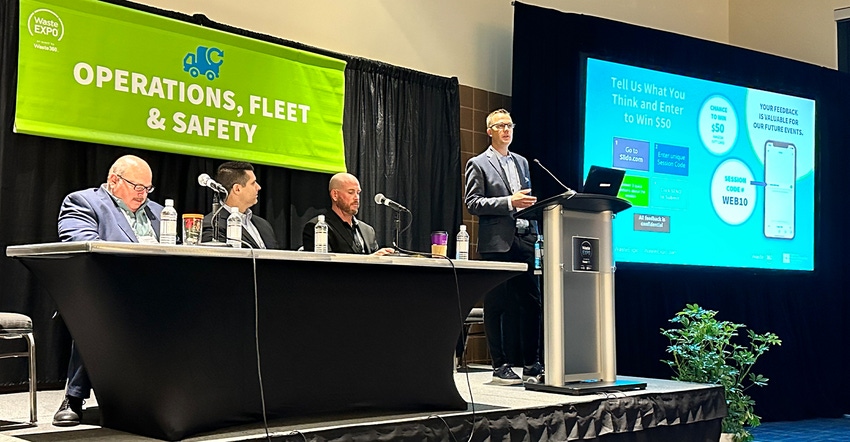It’s no secret that fleets play a huge roll in the waste and recycling industry. While trucks and haulers have remained constant in the waste field, the fuel or energy that runs them has not.

It’s no secret that fleets play a huge roll in the waste and recycling industry. While trucks and haulers have remained constant in the waste field, the fuel or energy that runs them has not.
As suppliers and fleet managers have worked tirelessly to improve the states of their fleets and their carbon footprints with different fuel types.
Martin Mattsson, director of key accounts at Volvo Construction Equipment North America, moderated the State of Sustainable Fleets panel, early Wednesday morning which featured speakers who spoke at length on different energy sources for fleets. Among those speakers were Scott Trible, Director of Sales at Mansfield Energy, Vincent Benini, Chief Commercial Officer at Positive Energy, and rounding out the group was Harland Chadbourne, Director of Purchasing as Waste Pro USA.
Trimble was the first speaker to take the podium to discuss ways that attendees could achieve sustainability goals and reduce their overall carbon footprint. Diesel and biodiesel solutions were the focus of his presentation and from his showcase, attendees learned that renewable diesel can be dropped into fleets today and can reduce emissions by 67%. This change would help make fleets clearer, more efficient and operationally sound, and bring us closer towards sustainability.
“The top two biofuels are biodiesel and renewable diesel. Biodiesel is a renewable fuel typically blended with ULS No.2 or standard diesel fuel with common blend rates of B5, B10, and B20. Renewable diesel, a similar product, but it’s a drop-in replacement. Meaning, you can use up to 100% blends with no engine impact,” said Trimble.
Following Trimble, Benini took over to give a presentation on EV batteries, the benefits that comes with them, and electric vehicles. For our regular, everyday vehicles, the industry has exceeded 5% adoption and looks to exceed 25% by 2025. Fleets are on a similar path with refuse trucks, school buses, and other delivery vehicles. Specifically, vehicles that have a home base to return to be charged overnight.
“They can be a little more expensive upfront, sure, ultimately we’re hitting a point where battery costs have come down and between that and incentives, these systems are able to drive a total lifetime cost savings that can easily justify, from an economic perspective, the transition to new sustainable fuels,” said Benini. “The dollar savings can be pretty be pretty significant. You know, we’ve seen as high as 73% savings in the cost of energy when it comes to deployment of battery storage technology in conjunction with EV fast chargers.”
Last to take the podium was Chadbourne, and he dove in on the world of compressed natural gas (CNG) with a focus on the cost of different fuels and solutions that worked for Waste Pro USA. The Department of Energy provided a study that believes the 100-plus years supply of natural gas is going to continue to be a lower cost fuel for many, many years. Another way CNG is helping funds for companies like Waste Pro USA is through tax credits.
“You don’t get a 50-cent tax credit for diesel fuel. You don’t get a tax credit for electrical, except maybe upfront. … At Waste Pro, and all it’s history since 2014, since these tax credits were available, we’ve had over $12 million in tax credits back from just the 50-cents off per gallon.” said Chadbourne.
Each speaker presented ways that their specific fuel or energy choice was beneficial to fleets, but all three speakers were in agreeance that the future of fleet fuels will not have one clear answer. The panel estimates that each will have its own place in the industry in the future.
About the Author(s)
You May Also Like




